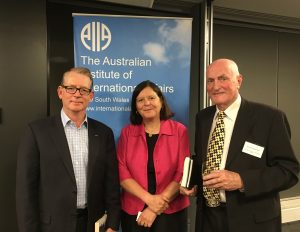"China Matters"
On Tuesday 29th of August, AIIA New South Wales hosted, at the law firm Mallesons, the launch of China Matters: Getting it Right for Australia by Bates Gill, Professor of Asia-Pacific Studies at the Strategic and Defence Studies Centre, ANU, and Linda Jakobson, noted authority on China and founder of China Matters, an Australian public policy initiative.
Linda stated that the primary goal of the Chinese Communist Party (CCP) was to maintain political stability and ensure a continued socialist system of government. Its leader, Xi, is also driven to achieve his Two Centenaries goals, which aim to double per capita income and have national living standards comparable to that of a small European country by 2021. However, Linda noted that Xi’s plans face significant internal barriers in the form of endemic nepotism and corruption within the bureaucracy. These are issues which he has promised to address on a number of occasions, yet are likely to remain unless the juridical system is granted independence from the CCP – something they will not consider. This issue is further complicated by the presence of an increasingly well-travelled middle class who have benefitted from China’s opening up to the world. Chinese citizens are not eager to see the implementation of the “Great Firewall” the CCP has promised. Lastly, as China’s economy shows signs of slowing, Xi will also have to determine a new growth model which will move from capital accumulation to capital productivity.Linda concluded that although Xi displays a confidence and vision that his predecessors did not possess, he must first overcome these domestic challenges before he can achieve his ambitious Two Centenaries goals.
Bates Gill focused on how China is attempting to deflect international attention away from its human rights records and towards its more praiseworthy cultural and economic achievements. He agreed with Linda’s assessment that ultimately, China employs its power overseas to maintain the power and legitimacy of the CCP. In particular, Bates believed that China had developed its own brand of “soft power with Chinese communist characteristics”. This is made manifest in Australia by ensuring that all Chinese newspapers are run by Chinese state owned enterprises, or through the monitoring of academic discourse on China within Australian universities. However, Bates was also quick to note that China is also not averse to using more overt means of influencing international opinion. He cited the example of the sanctions imposed on Norway after the Nobel Prize Council decided to award the 2010 Peace Prize to human rights advocate Liu Xiaobo, a political prisoner in China. It was not until his death in 2016 that Norway apologised and the trade restrictions were lifted. Given Australia’s close ties to China, Bates wonders if China will resort to punishing Australia in a similar fashion if we are perceived to criticise China too vocally.

Linda concluded by saying that Australia needs to put more effort into understanding China, learning to speak the language, and engaging with China more. In order to respond better “we must get to know them better” – we will be better able to protect our own national interests if we know who we are dealing with and what their objectives are. Bates and Linda closed by saying that qualitatively and quantitatively, China presents the largest challenge that Australia has faced. There are enormous opportunities but also great threats.
Report by Regan Ho
AIIA NSW intern
